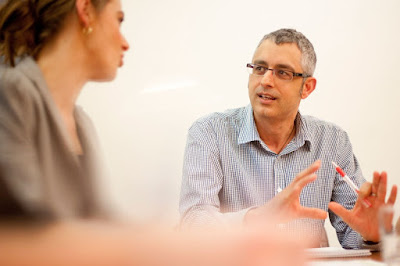The huge push across the higher education sector for industry collaboration means that these initiatives are more important than ever!
We interviewed Marguerite and Lara separately about their perspectives on the IMNIS industry mentoring scheme and the broader project of bringing academia and industry closer together to collaborate and learn more from each other.
Establishing these connections will also enhance opportunities for highly qualified professionals, with a PhD, in different industry sectors.
---------------------------------
BIO: Dr Marguerite Evans-Galea trained in world-leading laboratories in the USA at the University of Utah and St. Jude Children’s Research Hospital. She is the Executive Director of the Industry Mentoring Network in STEM (IMNIS) with the Australian Academy of Technological Sciences and Engineering (ATSE), Honorary Fellow Manager at the Murdoch Childrens Research Institute and Honorary Fellow at The University of Melbourne.
What do you think are the greatest strengths of PhDs when going to work in industry, post-degree?
Marguerite: PhDs bring a wealth of skills that can strongly complement existing expertise in any organisation.
Graduating with a PhD means you are among Australia’s best critical thinkers, trouble-shooters and problem solvers. To successfully complete a PhD project, you have developed tenacity and are capable of pursuing tough questions, being innovative to overcome challenges, and push the forefront of knowledge or application. You can ask a question, gather the data and objectively analyse the evidence before you to reach a logical conclusion. This is the scientific process. You don’t change your mind – you cannot change your mind – because you know “the data are the data”. The evidence is what guides you.
In addition, you’ll have developed skills in public-speaking, project management, risk assessment and scientific writing. Importantly, through your research and attendance at conferences, you’ll often have experience in collaborating and networking to boot! If you engage online, you’ll also have some research communication skills. The skills you develop in the course of doing a PhD are all highly transferable!
What are some of the most significant challenges for PhDs moving into industry?
Marguerite: The greatest challenge for anyone leaving research, especially if they have been in research for some years, can be their losing their identity as a researcher. For example, people will ask themselves “Am I still a scientist?”, and my answer is a resounding YES! You are a fully-qualified researcher. You will always apply the research processes to your work, whatever you do. It is inherent in your professional qualification! It can be a bit like riding a bike or driving a car. Once you learn it, you know it, and you just automatically do it.
Why did you choose to take on this role at IMNIS?
Marguerite: I’m a change-maker who loves to help people! That’s why IMNIS is a good fit for me. I love research – always will – and I knew I would only ever leave research for a role with meaning and purpose.
IMNIS has the vision to foster a collaborative culture of innovation that values basic research by bringing industry and academia closer together. It broadens the scope of our young researchers, increases their understanding of industry, and expands their skills and network. It has immense potential to diversify how we do research in the future!
Every day I catch myself saying “this is just like managing a collaborative research team” or “like reviewing a manuscript” or “like trouble-shooting a research project”.
>> To find out more, visit the IMNIS website!
---------------------------------
2. Interview with Lara Bereza-Malcolm
BIO: Lara Bereza-Malcolm is a PhD student at La Trobe University in the Department of Physiology, Anatomy and Microbiology. Her PhD project is focused on the development of microbial biosensors for the detection of heavy metals in the environment. Lara participated in the MedTech-Pharma Pilot of the IMNIS program, in Victoria from 2015-2016.
What were the best aspects of the mentoring experience you had?
Lara: I enjoyed multiple aspects of my IMNIS experience.
It was an invaluable opportunity to be paired with my mentor with such a rich background and knowledge base. I also enjoyed having the opportunity to network during the various event held by the IMNIS team.
I really appreciated the opportunities that I was given during my time as a mentee. I feel that I have gained a broad-range of skills from my experiences.
What would you consider the biggest challenges of that same mentoring experience?
Lara: Setting time aside to meet with my mentor was difficult at first because, as a PhD student, I felt that I should always be in the lab or writing!
However, I found that actively setting time aside to meet and learn from my mentor was very rewarding. It highlighted how essential it is to do more than just research during your PhD.
I also found it difficult to approach people I didn’t know during the first IMNIS event. However, I learnt from my mentor - and through practice! - that the best way to make a new contact is to approach them directly and just introduce myself.
During the industry mentoring program, what did you learn about yourself?
I learnt that I have a skill-set that can be applied outside of research, and that I have the ability to make connections with people from all aspects of business and industry.
I also learnt that I could be a mentor to others and help them, just like how my mentor guided me.
>> For more information, check out La Trobe's industry mentoring scheme page!



Comments